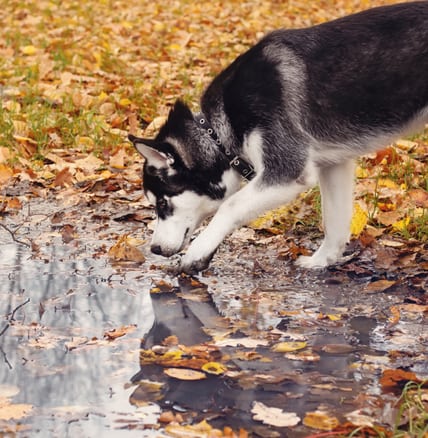Preventing the Spread of Dog Leptospirosis in Matthews, NC
Leptospirosis is a zoonotic bacterial disease that can affect both humans and animals. The Leptospira bacteria can be found in water and soil just about anywhere in the world, including right here in North Carolina. What makes leptospirosis a concern is the fact that it can be found in so many places and can make pets very, very ill if it is not caught and treated quickly.
At Caring Hearts Animal Hospital in Matthews, our veterinarians understand the risks posed by this disease. That’s why we recommend the dog leptospirosis vaccination. Cats are rarely affected and experience only mild symptoms, so they do not need to be vaccinated. Vaccinating your pet not only protects them from infection; it also prevents the disease from spreading to other animals and people.
Areas of High Risk
Your pet’s risk of exposure to leptospirosis increases significantly when they spend time in or around:
- Large puddles
- Lakes and ponds
- Rivers, streams, and creeks
- Rural property/farms
- Wooded areas teeming with wildlife
If your backyard is a high-traffic area for rodents, deer, and raccoons, that could also increase your pet’s risk of becoming infected.
How Your Pet Can Become Infected
Infection occurs when the Leptospira bacteria come into contact with the mucous membranes or any type of skin wound, such as a cut, scrape, or bite. There are several ways that your pet can contract leptospirosis from their environment:
- Puddles of infected urine
- Urine-contaminated soil or water
- Infected food or bedding
- Being bit by an infected animal
- Eating tissue from an infected carcass
In rare cases, leptospirosis can even be spread via breeding.
Symptoms of Leptospirosis
Leptospirosis affects dogs in different ways. While some may show few, if any, signs at all, others may become severely ill or even die. The important thing is to recognize any signs that do occur so you can have your pet treated quickly.
Common symptoms include:
- Fever
- Trembling/shivering
- Tender muscles
- Decreased activity and movement
- Excessive thirst
- Increased urination
- Vomiting and diarrhea
- Loss of appetite
- Lethargy
What makes leptospirosis dangerous is that it can cause kidney failure, bleeding disorders, and the buildup of fluid in the chest and abdomen.
Treatment
To diagnose leptospirosis, we will need to examine your pet thoroughly and perform blood and urine tests to rule out other conditions. X-rays may also be involved in helping us make a diagnosis. For treatment, antibiotics and plenty of supportive care are the best option. Furthermore, early and aggressive treatment is ideal for reducing damage that may be done to your pet’s liver and kidneys.
Prevention is the best medicine—if you believe your dog is at a higher risk of becoming infected with leptospirosis, contact us to discuss vaccination. Our leptospirosis vaccine can offer your dog a full year of protection, so we highly recommend yearly vaccinations.

